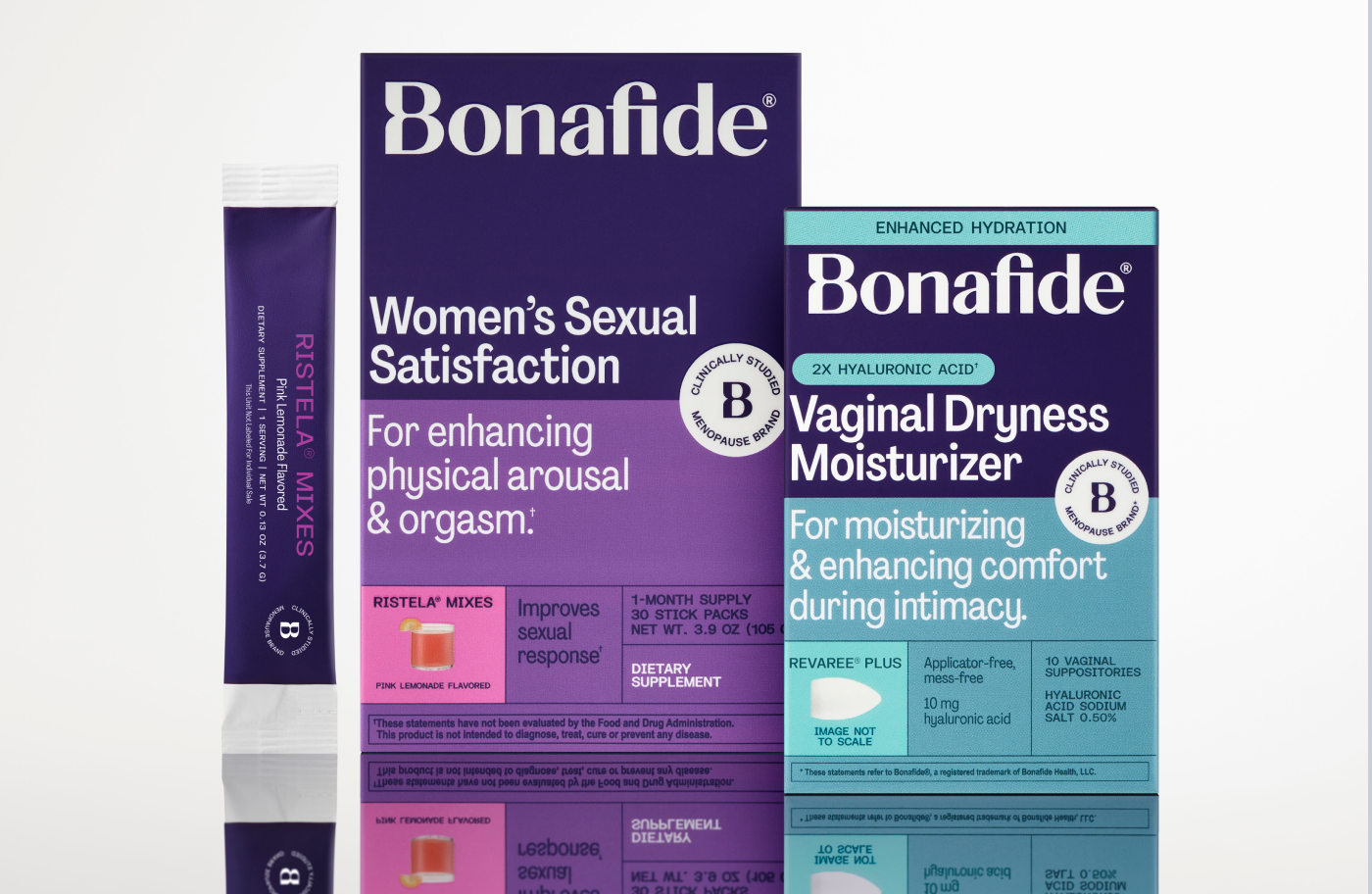You may have noticed that orgasms feel different during perimenopause—perhaps they’re less intense, harder to reach, or just not what they used to be. This shift is often confusing and frustrating, especially when you’re otherwise healthy and still sexually active. Perimenopause and a change in orgasm intensity could be related and there may be several contributing factors.
With that said, it can come as a surprise if your feelings towards sex—and how your body responds—change during perimenopause. If you've noticed changes in your sex drive as you enter and move through the menopause transition, you’re certainly not alone. It's estimated that around 45% of women experience sex-related issues in midlife.1
Because your body is changing, and you deserve real answers on what’s going on with your orgasms during perimenopause – let’s dive more into the topic.
Could Perimenopause Cause Problems with Orgasm?
Orgasms are complex. They involve the coordination of multiple activities in the body including our hormones, nerves, blood flow, muscle contractions, and the brain. During perimenopause—the transition time leading up to menopause—several of these elements are in flux.
The following are some of the things that may affect orgasm during perimenopause.
Declining Estrogen Levels
Estrogen helps maintain vaginal lubrication and blood flow to the pelvic region. As hormone levels become volatile during perimenopause, you may notice vaginal dryness, tightness, or reduced sensitivity—all of which may make orgasms feel muted or harder to reach.2
Additionally, a reduction in blood flow may make the clitoris less sensitive to stimulation and orgasms less intense or harder to achieve during menopause.3
Decreased estrogen may also lead to the thinning of the vulvar and vaginal tissues, as well as moisture reduction and a lack of lubrication, that leads to inflexibility and sensitivity. The end result may be pain with any kind of vaginal penetration.4
Lower Testosterone
Often overlooked, testosterone plays an important role in sexual desire and orgasm intensity for women, too. Levels decline gradually with age, and even small drops may lead to changes in sexual health, especially during perimenopause.5
Pelvic Floor & Vaginal Changes
The muscles involved in orgasm—the same ones you engage during Kegels—may weaken over time due to a decline in estrogen. This may reduce the rhythmic contractions that create that familiar “wave” of sensation during orgasm and may decrease the intensity of orgasms during perimenopause.6
At least half of menopausal women will also experience genitourinary symptoms of menopause, also known as GSM, including vaginal atrophy.7 This collection of symptoms is caused by the gradual decline of elasticity in tissues that make up and support the genitals and urinary system due to reduced levels of estrogen. Women may experience noticeable symptoms of vaginal atrophy, like vaginal dryness, burning, irritation, and itchiness.8
So, while women are starting to deal with vaginal atrophy, pelvic floor muscles can also start to become less resilient and less supportive due to low estrogen. This may cause or worsen symptoms like bladder leakage and urinary frequency or urgency.9 Therefore, multiple changes in the physical structures may lead to changes in orgasms during perimenopause.
Brain–Body Disconnect
The stage before menopause—perimenopause—may also bring a mixture of undesirable symptoms, such as fatigue, mood swings, period changes, and sleep disturbances, that are tied to fluctuating and declining hormones. These uncomfortable symptoms may interfere with sexual desire and your ability to focus or stay present during intimacy.
This may be layered on top of emotional and psychological factors that often accompany these hormonal changes—such as body image concerns, embarrassment around sex, or deeply-held religious and cultural beliefs. Plus, stressors like financial difficulties or the loss of a loved one may take a toll. Mental health conditions can also play a role as well as relationship dynamics, including unresolved conflicts, poor communication, or a breach of trust.10
These symptoms and feelings may all contribute to the biological and psychological effects that are already affecting your body and are leading to weaker orgasms during perimenopause.
In one popular Reddit thread, women echo these orgasm changes—describing orgasms as “weaker,” “harder to reach,” “like a misfire,” or “just not worth the effort.” One person shared: “My body still reacts like I’m orgasming... but the release and the waves of pleasure are kind of… skipped.” 11
So yes, perimenopause may be contributing to problems with orgasm—but it’s not all bad news.
How to Achieve a Better Orgasm During Perimenopause
The next step is to figure out how to make an orgasm feel better. Awareness is step one. Small shifts in mindset and habits can make a big difference in your orgasm during perimenopause.
Here are some science-backed ways to help reclaim your pleasure: 12,13,14
- Reintroduce foreplay (and then some): Longer arousal time helps increase blood flow and sensitivity in the genital area. Think massage, warm baths, and a slower buildup. What used to work may not be enough now—and that’s okay. Take the time to explore.
- Try pelvic floor exercises: Kegels help strengthen the muscles that have weakened over time but need to contract during orgasm. Even five to 10 minutes a day may lead to stronger sensations and better control over climax.
-
Explore lubrication: Don’t underestimate the power of a good lube. Water- or silicone-based lubricants help to reduce discomfort, especially if vaginal dryness is holding you back from being intimate during perimenopause.
-
Practice mindfulness or breathwork: Being present and connected to your body can help to enhance sexual satisfaction. Apps or guided meditations focused on intimacy may help to retrain your brain for pleasure, as well.
-
Consider hormone therapy or vaginal estrogen: Some women may benefit from localized estrogen treatment to improve vaginal tissue health and sensation. Talk to your healthcare provider about what’s safe and appropriate for you.
- Explore different types of touch: Vibrators, pelvic wands, and other devices offer more direct stimulation – and consider direct clitoral stimulation as not all women reach orgasm through penetration alone.
Finding Your Way to Better Orgasms
Changes in your sexual response may feel disorienting. The good news? You don’t have to suffer in silence. Whether it takes pelvic floor work, better communication with your partner, hormone support, or relearning your body, you can find your way back to deeper, more satisfying orgasms.
For a quick video on how to improve your sexual satisfaction, check out the below from Chief Medical Officer, Dr. Alyssa Dweck:
Resources
- https://pmc.ncbi.nlm.nih.gov/articles/PMC6226268/
- https://menopause.org/patient-education/menopause-topics/sexual-health
- https://www.healthline.com/health/menopause/can-a-woman-have-an-orgasm-after-menopause
- https://menopause.org/patient-education/menopause-topics/sexual-health
- https://my.clevelandclinic.org/health/diseases/24897-low-testosterone-in-women
- https://pmc.ncbi.nlm.nih.gov/articles/PMC8766258/
- https://my.clevelandclinic.org/health/diseases/15500-vaginal-atrophy
- https://my.clevelandclinic.org/health/diseases/15500-vaginal-atrophy
- https://www.medicalnewstoday.com/articles/low-estrogen-bladder-symptoms
- https://www.mayoclinic.org/diseases-conditions/anorgasmia/symptoms-causes/syc-20369422
- https://www.reddit.com/r/Menopause/comments/17or3yo/so_this_peri_thing_and_having_orgasms/
- https://www.healthline.com/health/menopause/can-a-woman-have-an-orgasm-after-menopause
- https://pmc.ncbi.nlm.nih.gov/articles/PMC11513599/
- https://www.ncbi.nlm.nih.gov/pmc/articles/PMC6487288/









